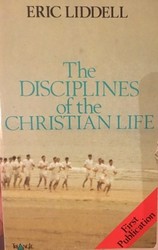A number of books have been written about Eric Liddell that are perhaps mostly read by fellow Christians. There may be those who admire his stand at the 1924 Paris Olympic Games in which he ran. Others may know of his tenacity in the years of growing Japanese activity in North China with his fine contribution in the Japanese internment camp in which he died. It is therefore notable that acclaimed sporting biographer, Duncan Hamilton, should write about Liddell’s life.
Given his sporting interest, Hamilton naturally gives in-depth coverage of Eric Liddell’s sporting years and almost meteoric rise to fame. However, he goes on to consider his subsequent years to, giving justice to his motivation in serving Jesus Christ and the people of China, as his parents had done. In this, Hamilton goes beyond the story popularized in the award-winning film Chariots of Fire (1981) to look at the other two-thirds of his life which were located in China.
The flyleaf of the hardcover, published in 2016 by Doubleday (a secular publisher),[1] acclaims the book as “the definitive biography of one of Britain’s greatest ever heroes, who made the ultimate sacrifice while becoming the moral centre of an otherwise unbearable world.” I’m not sure that Liddell would have found this correct. For him, the moral centre was always Jesus and that is who he sought to emulate. Perhaps this is an understandable comment from a non-Christian perspective. But given that, perhaps it is all the more commendable that a missionary and convinced practicing Christian is considered as a worthy and inspiring topic. One blogger commented with some surprise:
When I picked up Duncan Hamilton’s recent biography, I was expecting a much less flattering picture. A missionary biography written by an apparent non-believer with no clear Christian sympathies printed by a secular publisher is bound to find all the dirt and put it out so everyone can see it. I expected to find private details with hints of suspicious activities at every turn. That, however, is not the case.[2]
The biography really shows that Liddell sought not his own glory in his sportsmanship, teaching, and outreach, but always the glory of God. It does this by looking at three periods of Liddell’s life, compellingly entitled: Faster, Higher, Stronger.
The first period deals with how he became an athlete, succeeded beyond all expectations and in the face of assorted obstacles. He ran fast! He became faster even with his hallmark ungainly style. The second period deals with his decision to return to China, where he’d been born, in order to “run a different race” (p. 124). He had a higher calling which involved teaching in Tientsin (now Tianjin), and then supporting the London Missionary Society (LMS) team in Siaochang (now Xiaozhang, Hebei) as the Japanese became increasingly belligerent. During this time of confusion, Hamilton considers the LMS to be “maddeningly inept”, having only the “vaguest acquaintance with reality” (p. 218), and a “wonky antenna for danger” (p. 219). The result was that while Liddell’s pregnant wife and two little girls were able to leave for Canada, Eric remained in occupied Tientsin. This is then the third period in which he became stronger than ever in his faith as his curtailed movement left much time for reading (his favorite, the Sermon on the Mount) and writing (a book called Disciplines of the Christian Life).

Eric Liddell’s manuscript copies of this were located
and it was printed for the first time in 1985
Eric Liddell was emphatic:
Every Christian should live a God-guided life. If you are not guided by God, you will be guided by something else. (p. 226)
God continued to be his guide as he ended up in an internment camp in Weihsien (Weifang, Shandong) along with many other foreigners. Here, where he spent some 694 days, he was known for his modesty, honesty, impartiality, unstinting service of others, mentoring of the young people—and his running, always to inspire others. He ran his last race as he succumbed to a brain tumor.
Hamilton has used a wide range of sources combing the London Missionary Society archives, interviewing those who knew Liddell personally, drawing on family archives. He made a trip to China and met many people on Liddell’s trail. His journey led him to conclude:
Valorous lives like this, which must be calculated in terms of value rather than length, encourage us to make our own lives better somehow. (p. 321)
While Hamilton traces not only Liddell’s physical races, on and off the track, he also recounts his hard-run spiritual race and the training that accompanied and enabled both. In doing so, Hamilton honors both the man he calls an “Olympic hero,” and his Christian faith making him a “modern martyr.” For Eric Liddell, the glory of gold paled compared to the glory of God.
For other insights:
- “A Short Biography of Eric H. Liddell (1902 – 1945),” Eric Liddell Centre, https://www.ericliddell.org/about-us/eric-liddell/biography/
- https://www.theguardian.com/sport/gallery/2012/jan/04/olympic-moments-eric-liddell-pictures
- “50 stunning Olympic moments: Eric Liddell's 1924 triumph—in pictures” by Steven Bloor, The Guardian, 4 January 2012, https://www.bbc.com/news/uk-scotland-18856533
- “With Love In Their Hearts: Eric Liddell” by Kofi, The Journey of a Wounded Pilgrim, July 5, 2014, https://kofigyasiacquah.wordpress.com/tag/china/
- “'God made me for China:' Eric Liddell, beyond Olympic glory,” R. Albert Mohler Jr. Washington Times, November 29, 2017, https://www.washingtontimes.com/news/2017/nov/29/god-made-me-for-china-eric-liddell-beyond-olympic-/
Other Books on Liddell:


Eric Liddell: Pure Gold: The Olympic Champion Who Inspired Chariots of Fire by David MacCasland.
Eric Liddell: Pure Gold: The Olympic Champion Who Inspired Chariots of Fire by David MacCasland, Chinese version.



Run to Glory: The Story of Eric Liddell by Ellen Caughey
Eric Liddell (Heroes of the Faith series) by Ellen Caughey
因愛著中國 (For the Love of China) by Ellen Caughey
Image credit: Brandi Redd on Unsplash

Andrea Klopper
Andrea Klopper has taught in South Africa, the United Kingdom, and China. She has mentored Mandarin language students and developed a cultural orientation and acquisition program which she used in two organizations. She is now being challenged to make friends in a new location and learning a new language. She …View Full Bio
Are you enjoying a cup of good coffee or fragrant tea while reading the latest ChinaSource post? Consider donating the cost of that “cuppa” to support our content so we can continue to serve you with the latest on Christianity in China.
